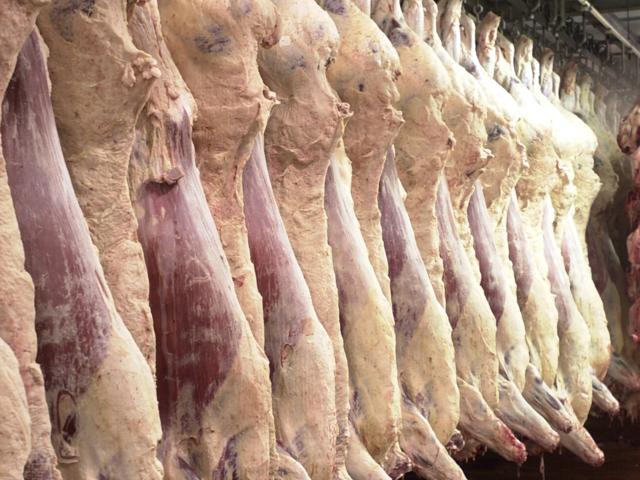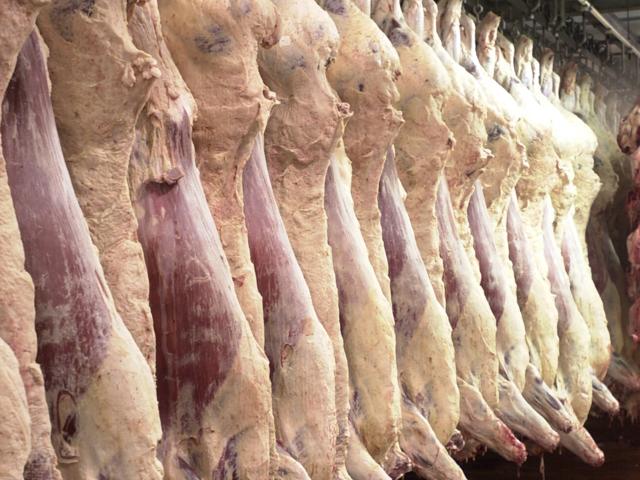Ag Policy Blog
President Biden to Spotlight Challenges in Livestock Markets and Meatpacking Industry
OMAHA (DTN) -- President Joe Biden will start of 2022 highlighting what the White House sees as unfair market practices by the largest meatpackers and detail plans to diversify the meatpacking industry while increasing enforcement over anti-trust practices in the industry as well.
The White House announced that Biden will meet virtually with "family and independent farmers and ranchers" on Monday as the administration will roll out a plan to "boost competition and reduce prices in the meat-processing industry." The White House points to "corporate consolidation" that "has led to rising prices for consumers and lower earning for farmers and ranchers."
Biden, Agriculture Secretary Tom Vilsack and Attorney General Merrick Garland will announce what they are calling "the Biden-Harris Administration's Action Plan for a Fairer, More Competitive, and More Resilient Meat and Poultry Supply Chain."
Plans detailed by the White House likely will not sit well with the country's largest beef and pork packers -- Tyson, JBS, Smithfield, National Beef, or Cargill -- as the packing industry has claimed that "black swan" events such as the pandemic, labor problems and supply-chain challenges had driven up prices for consumers, and higher retail prices were not caused by a concentrated industry. In December, the North American Meat Institute criticized the White House Economic Council for a report looking to "shift blame for record food inflation to the meat and poultry industry."
The plan rolls out a variety of meatpacking processing initiatives at USDA, plans to tighten up enforcement of the Packers and Stockyards Act, and a strategy by USDA and the Department of Justice to "better coordinate" antitrust efforts as well.
The White House cited that the meat and poultry processing sector "is a textbook example" of corporate consolidation that is "hurting consumers, producers and our economy." The White House cited that the four largest packers control 85% of the beef market and 54% of the poultry processing. In pork, it's about 70% of the market.
The White House will highlight $1 billion from the American Rescue Plan to expand packing capacity for independent meat processors. Vilsack had announced as far back as July that USDA would be providing up to $500 million in loans and grants to independent packers, but those funds have not been released.
Along with that, the Biden-Harris administration will also highlight plans to tighten the Packers and Stockyards Act, revisiting rules that USDA has been trying to finalize since the late days of the Obama administration. USDA has three proposed rules to tighten enforcement of the Packers and Stockyards Act meant to provide producers with more leverage and the ability to sue for unfair competitive practices by packers.
USDA and DOJ also will create a portal to report concerns about violations of antitrust laws that will allow them to better understand farmers' and ranchers' concerns, the White House stated. Along with that, the White House will work with Congress to create more transparency in cattle markets. The White House endorsed legislation by Sens. Chuck Grassley, R-Iowa, Deb Fischer, R-Neb., Jon Tester, D-Mont., and Ron Wyden, D-Ore., that would require a set level of negotiated cash trade in cattle markets based on regions in the country. That legislation has been divisive in the Senate and in the cattle industry despite multiple hearings last summer over the state of cattle markets.
P[L1] D[0x0] M[300x250] OOP[F] ADUNIT[] T[]
USDA will also issue a new "Product of USA" labeling rules to help consumers better understand where their meat comes from. Under current rules, meat can be labeled "Product of USA" if it was processed here -- meaning livestock raised outside the U.S. can be labeled Product of USA if the animal or meat is further processed in the U.S. The White House stated, "We believe this could make it hard for American consumers to know what they are getting. USDA has already begun its top-to-bottom review of the current labeling rules and consumers' understanding of the labels, with the goal of new rulemaking to clarify 'Product of USA' standards."
Regarding processing funds, the White House detailed that USDA will release plans for at least $375 million of those funds today. USDA will open up a request for proposals for approximately $150 million to "jump-start" at least 15 processing projects and release those funds this spring. Another $225 million will be rolled out in phase II this coming summer, the White House stated.
Also to help independent packers, USDA will release another $275 million in loan guarantees with lenders as well to provide "long-term affordable capital" with those funds expected to be released by the summer as well.
USDA will also dedicate another $100 million to support the expansion of the work force for packers as well "to support development of a well-trained workforce, safe workplaces, and good-paying, quality jobs by working closely with partner organizations, including labor unions, with expertise in workforce development and worker health and safety."
Another $100 million will go to reduce overtime inspection costs for small and "very small" processing plants to keep up with demand. Those funds had also been provided by Congress to help small processors ship meat across state lines with federal inspection approval. USDA had already issued $32 million in grants to 167 meat and poultry processing facilities for them to become certified for federal inspections.
Another $50 million will go to helping expand technical assistance for environmental and food-safety issues to help independent businesses expand processing capacity as well.
"The meatpackers buy from farmers and sell to retailers like grocery stores, making them a key bottleneck in the food supply chain."
The White House added, "Most farmers now have little or no choice of buyer for their product and little leverage to negotiate, causing their share of every dollar spent on food to decline. Fifty years ago, ranchers got over 60 cents of every dollar a consumer spent on beef, compared to about 39 cents today. Similarly, hog farmers got 40 to 60 cents on each dollar spent 50 years ago, down to about 19 cents today."
In meeting with farmers and ranchers, the White House stated the "producers will talk about the challenges they have faced as large conglomerates have absorbed more and more smaller processors."
The White House pointed out the strategy in all of this is to reduce inflationary concerns.
"The president continues his aggressive work to tackle the causes of the higher prices American families have been facing," the White House stated.
Inflation was among the reasons that were cited by critics of Biden's "Build Back Better Act" that was at least temporarily derailed last month when Sen. Joe Manchin, D-W.Va., stated he could not support the bill because of the impact on inflation and the national debt.
Chris Clayton can be reached at Chris.Clayton@dtn.com
Follow him on Twitter @ChrisClaytonDTN
(c) Copyright 2022 DTN, LLC. All rights reserved.






Comments
To comment, please Log In or Join our Community .